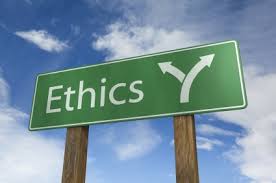Job titles of the future: Chief Ethical and Humane Use Officer
If 2018 was the 'Year of AI' in enterprise technology, 2019 is shaping up to be Year 2 I would suspect. The development, growth, spread, and seeming ubiquity of technology providers touting their AI and Machine Learning powered solutions is showing no signs of slowing as we end 2018. As with any newer or emerging technology, the application of AI technologies offer great promise and potential benefits, but also can lead to some unexpected and even undesirable outcomes, if not managed closely and effectively.
One leading enterprise technology company, Salesforce, is acting more proactively than most AI players in recognizing the potential for negative applications of AI tools, and is taking steps to address them, most notably by creating and hiring for a new position, today's 'Job Title of the Future' the 'Chief Ethical and Humane Use Officer.'
Details from reporting on Business Insider on the new appointment:
In the midst of the ongoing controversies over how tech companies can use artificial intelligence for no good, Salesforce is about to hire its first Chief Ethical and Humane Use officer.
On Monday, Salesforce announced it would hire Paula Goldman to lead its new Office of Ethical and Humane Use, and she will officially start on Jan. 7. This office will focus on developing strategies to use technology in an ethical and humane way at Salesforce.
"For years, I've admired Salesforce as a leader in ethical business,” Goldman said in a statement. “We're at an important inflection point as an industry, and I'm excited to work with this team to chart a path forward."
With the development of the new Office of Ethical and Humane Use, Salesforce plans to merge law, policy and ethics to develop products in an ethical manner. That's especially notable, as Salesforce itself has come under fire from its own employees for a contract it holds with U.S. Customs and Border Protection.
A C-Level hire with the remit to develop strategies to use tech in an ethical and humane way is a pretty interesting approach to the challenges of increasingly powerful AI powered technologies being let loose in the world. Most of the time, enterprise tech companies sell or license their technologies to end customers who are then more or less free to apply these technologies to help them solve their own business challenges. The technology providers typically have not waded into making value judgements on their customers or the ways that the technologies are being applied to the customers' ends.
What Salesforce seems to be indicating is that they intend to be more intentional or even careful about how their technologies are used in the market, and want to signal their desire to ensure they are used in an ethical and humane way.
This to me is a really interesting development in how technology (or potentially any kind of product producer), may need to look at how their products are used by customers. This role at Salesforce is focused on AI technologies, probably because AI seems to be an area ripe with the potential for misuse. But AI tools and technologies are by no means the only product that once unleashed on the market can drive negative outcomes. Here's a short and incomplete list: firearms, soda, fast food, tobacco products, cars that drive 150MPH, skinny jeans, and on and on.
Will this appointment of a Chief Ethical and Human Use Officer at Salesforce mark the start of a new trend where product creators take a more active role in how their products and solutions are applied?
We will see, I guess, it will be interesting to watch.
Have a great day!

 Steve
Steve




